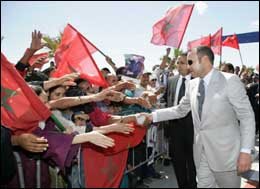
King Mohammed arrived in the territory's main city of Laayoune late on Monday. He is to announce his autonomy proposals next month after years of unsuccessful U.N.-sponsored efforts to hold a referendum on self-determination in the Western Sahara.
Morocco has centuries-old rights over the territory rich in phosphates, fisheries and possibly offshore oil deposits but after former colonial power Spain pulled out in 1975 a low-level guerrilla war was started by the Algeria-backed Polisario Front.
A United Nations ceasefire was brokered in 1991 with the promise of holding a referendum on whether the Western Sahara remains under Rabat's control or becomes an independent state sought by the Polisario.
But disputes about who is eligible to vote have prevented the referendum from taking place.
During his tour, King Mohammed will inaugurate development projects and meet leaders of local tribes and civic associations.
The central government in Rabat plans to invest 7.0 billion Moroccan Dirhams in 226 development projects, including water and fishing schemes, over the next few years, the officials said.
The Polisario warned in a statement reported by Algiers state media that the king's visit could have "serious repercussions" on peace and stability in North Africa.
"Rabat has opted for provocation, escalation (and) tension," added the Polisario, which insists on a referendum and has rejected an autonomy deal.
SECURITY COUNCIL
King Mohammed was expected to wrap up his trip in the Western Sahara with a speech on Saturday, in which he may outline his vision of the territory's autonomy.
"This also aimed at bolstering Morocco's diplomatic offensive which seeks to better explain the kingdom's vision about a final settlement to this arbitrary conflict over the Moroccan Sahara," said state news agency MAP.
Moroccan officials have said Rabat will submit the autonomy proposals to the U.N. Security Council in April.
The Rabat government, which repeatedly affirms Morocco controls the Western Sahara, hopes to win U.N. support for its autonomy plan.
Officials have yet to give details of the proposals.
Moroccan political analyst Abdelmoughit Benmessaoud Tredano, author of two books about the Western Sahara dispute, said he believed Rabat's proposed autonomy would be "larger than regionalisation but less than independence".
"Local authorities in the territory will enjoy all the power of a local government, except defence, diplomacy, money and justice, which remain prerogatives of the central government," he told the local Economist newspaper.
Tags: Morocco Fes, Maghreb news

No comments:
Post a Comment